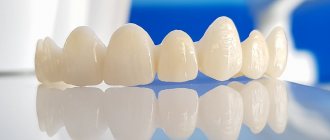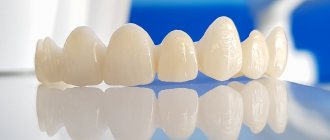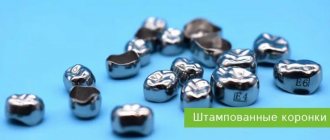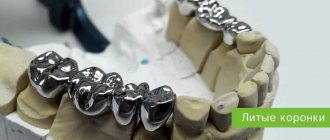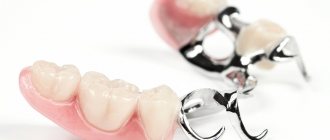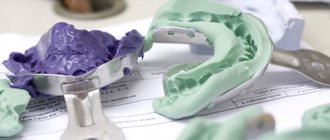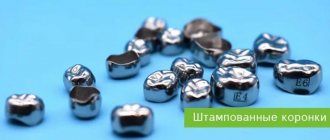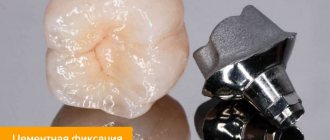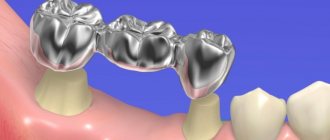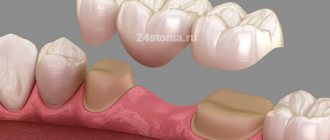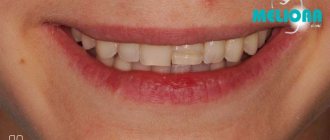A one-piece crown is a metal prosthesis, which is made from a cobalt-chromium alloy using modern one-piece casting technology. One-piece casting technology means that the entire crown is cast at once. In terms of price-quality ratio, installing solid crowns is one of the best methods for restoring chewing function. However, solid crowns have a low aesthetic appearance.
What are solid crowns, their advantages and disadvantages
A solid crown is an orthodontic structure used to replace a missing tooth. It is manufactured using the one-piece casting method. Suitable only for restoring chewing teeth; it will not look aesthetically pleasing on the front teeth. The construction is very durable and there are no cracks on it. The minimum service life is 10 years; with proper care, it can be significantly increased.
Advantages:
- affordable price;
- Full compliance with the shape of the tooth, tight fit to the gums;
- manufacturing taking into account the individual structural characteristics of patients’ teeth;
- durability;
- abrasion resistance;
- inertness towards body tissues, lack of negative impact on them;
- during installation, you can do without deep preparation, the teeth are ground down only 0.8 mm;
Flaws:
- unaesthetic appearance;
- high thermal conductivity, which is why eating hot food can cause discomfort;
- there is a possibility of allergic reactions to the components from which the crown is made.
Features of solid metal crowns
As already mentioned, for the manufacture of solid dental crowns, metal alloys are used, including precious ones: gold, platinum, silver, titanium, a combination of cobalt and chromium or nickel and chromium. All of them are the key to excellent strength, which determines the service life of the prosthesis for up to twenty years. Moreover, the use of noble metals in alloys increases their compatibility with native dental tissues and makes the structure hypoallergenic. It does not create prerequisites for the appearance of galvanic currents in the oral cavity, as is the case with metal analogs, which is one of the serious advantages.
Unlike their "predecessors" stamped crowns, solid crowns are not standard. They are produced using high-precision technology, which ensures their high quality and exact compliance with dental tissues. The tightest possible fit to them eliminates the risk of pathogenic microflora from the oral cavity penetrating under the crown and the development of secondary caries.
Types of solid crowns
- Without coating - this is the most inexpensive option; it looks like a tooth made of polished metal.
- Sputtered – gold is used as the sprayed material, so the design looks more attractive in appearance. It should be taken into account that spraying can negatively affect the mucous membrane.
- With lining. A plastic or ceramic overlay is applied to the front surface, which is visible when a person smiles. During the operation of such crowns, chips of the facing material often occur.
- Combined are bridge-like prostheses made of metal and metal-ceramics. They have an attractive appearance and can be installed in the smile area and in the place of chewing teeth.
If you want to know that this is a one-piece crown, a photo of the prosthesis is given below for informational purposes.
Service life of a metal crown
Metal crowns have high wear resistance and, in principle, break very rarely. Steel structures can serve a person for 12–15 years, titanium crowns - more than 20 years. If the patient has crowns with ceramic lining, their service life will be 7–8 years. At the same time, the structures do not require additional care and allow you not to change your usual diet, since they can withstand solid food. But we don’t recommend experimenting with biting wires or opening bottles with your teeth - everything has a limit. Treat crowns like your natural teeth.
Indications and contraindications for installation
Indications:
- the crown of the “native” tooth is severely damaged;
- malocclusion;
- excessive wear of teeth;
- bruxism;
- abnormal shape, size or location of teeth.
Contraindications:
- chronic periodontitis;
- inflammatory diseases of the oral cavity;
- metal intolerance.
It is important to know. It is rational to install a one-piece crown only if the destroyed tooth tissue cannot be restored with a filling.
What is a crown and why are we considering metal?
A crown is a dental structure that is a miniature thin-walled cap that is placed on a dilapidated or implanted tooth. The purpose of a dental crown is the functional and aesthetic restoration of the dentition.
Metal crowns
on teeth are characterized by high strength and long service life. In addition, metal microprostheses have the following advantages:
- The restored tooth does not require special preparation.
- The ability of the crown to withstand heavy workloads.
- The chewing functions of the tooth return in full.
- Easy to manufacture and install the prosthesis.
- Democratic price.
Solid crowns are made from an alloy of cobalt and chromium, which gives them a shiny, dark surface. Considering the low aesthetics of the element (the gray shine of the metal), crowns on teeth made of metal alloys are often made with a white coating and installed in the rear areas of the jaw that are invisible to view.
Let's look at all the pros and cons of metal crowns, this will help you make the right choice when installing them.
Crown installation process
- The doctor examines the patient's oral cavity and assesses its condition. If necessary, he issues recommendations for rehabilitation.
- An imprint of the tooth and the dentition itself is taken.
- The resulting prints are sent to a dental laboratory. The patient is given temporary crowns, wearing which will help in the future to quickly adapt to permanent dentures.
- Casting the crown in the laboratory, applying the veneering material.
- When the one-piece structure is made, the doctor fixes it in the oral cavity. It is important that the end of the crown is minimally immersed in the gum and does not cause discomfort. If necessary, the prosthesis is modified.
Making crowns is a lengthy process that can take 1-2 weeks.
Metal crowns: pros and cons
In appearance, a metal dental crown resembles a cap that is put on a damaged tooth or fixed to an implant if the first one is completely missing. The thickness of the metal crown is 0.2 – 0.3 mm. Its main advantages are the ability to withstand maximum chewing loads, affordable price and durability.
The disadvantage of a metal crown is its aesthetic imperfection - metal is much inferior in this sense to all other materials for making crowns. Therefore, such structures are installed mainly on the back teeth, where they are securely hidden from prying eyes.
Are metal crowns harmful?
It is fair to note that there is a possibility of galvanic reactions and allergies to metal crowns after their installation. To avoid such complications, clinics carry out thorough diagnostics, which makes it possible to identify the presence of allergies before a permanent structure is placed.
Features of care
- Daily proper care of dentures is important: brushing teeth and interdental spaces, using rinses and dental floss.
- It is necessary to monitor the condition of your gums.
- You should visit your dentist periodically to help identify the development of gingivitis and periodontitis at an early stage. These diseases lead to crown detachment.
- If the integrity of the prosthesis is damaged, you must immediately contact the clinic for its restoration or replacement.
The one-piece construction sits tightly on the chewing element and hermetically envelops it. Therefore, the patient should not worry about the fact that pathogens or food particles can penetrate under it.
Good to know. Modern solid crowns are not afraid of solid food and are resistant to chemical and thermal irritants.
What metal are dental crowns made of?
Modern dentistry offers a fairly wide range of materials for metal crowns:
- steel
- alloy of chromium and cobalt
- silver and palladium alloy
- titanium
- gold
- platinum
There was a period in Russia when dentists preferred gold among all types of metal for dental crowns, because due to its softness, the structures fit tightly to the teeth and have a gentle effect on neighboring ones. But today they are increasingly preferred to alloys containing platinum or titanium. These materials provide even greater durability and biocompatibility with human tissues.
Metal crowns with coating are very popular today in prosthetics. They allow you to recreate the anatomical shape of a tooth with minimal grinding of healthy tissue. The coating can be gold, palladium or platinum - at the patient's request - respectively, resulting in white coated metal crowns or yellow ones. For example, metal dental crowns coated with gold allow you to get long-lasting results without much damage to your wallet.
Do's and Don'ts after having a crown installed
- Water is allowed to be drunk immediately, but the patient will be able to eat food no earlier than after 2 hours.
- If prosthetics was performed on a pin, the chewing pressure on the tooth must be reduced, otherwise the pin and crown may move.
- At first, it is better to limit the consumption of drinks with coloring pigments. You should also avoid foods that are too cold or hot.
- It is recommended to cut solid food into small pieces.
- It is undesirable to eat viscous and stringy food, as it can lead to a gradual deterioration in the fixation of the prosthesis and its loss.
Cost of services
| Solid crown | RUB 5,750.00 |
| Solid cast crown, special alloy (excluding metal cost) | RUB 9550.00 |
| Solid crown for implant | 7130.00 RUR |
Of course, solid crowns have disadvantages. One of the few noteworthy “cons” is its lack of aesthetics. Solid crowns have the color of the material from which they are made. Some people think that a smile with an admixture of “metal” looks too unnatural. But this does not in any way detract from the advantages of this type of prosthesis. Moreover, the modern range of dental or completely change the color of the crown.
Our clinic provides a full range of dental prosthetic services. The full price list is available at this link.
Cost of installing solid crowns
The cost depends on the design features of the prosthesis and the materials that will be used in its manufacture. The cost of the service may also include the cost of obtaining an x-ray and installing a temporary prosthesis.
Specialists at the Saint-Dent Clinic dental clinic in Moscow offer clients high-quality dental prosthetics with solid crowns with a guarantee of long-term use. The clinic's doctors have many years of experience and regularly take specialized courses in the best dental centers in Europe, America and Asia. To provide medical services, the latest equipment and modern certified materials are used. Contacts of the clinic are located here CONTACTS. You can find out the cost of services in this PRICES section.
Reviews of doctors providing the service - solid crowns
Sincere gratitude to the dentist Mikhail Ivanovich Fedoseev!
Thanks for the impeccable work! Mirkerimov F.S. 08/15/2017 Read full review Mirkerimov F.S.
15.08.2017
Together with my husband, we have been treating our teeth in the dental department of the CELT clinic for more than 10 years. The time has come to place implants, and on the advice of our general practitioner Natalya Olegovna Elizarova, I turned to surgeon Evgeniy Borisovich Antyukhin. Despite his youth, the doctor has extensive experience in… Read full review
Olga
30.05.2017
Crown care, oral hygiene.
Solid crowns are strong and durable, but improper care of them, as well as some bad oral habits, can significantly shorten their lifespan. First of all, it is necessary to maintain oral hygiene. In addition, you should refrain from strong mechanical impacts on the crown - for example, do not chew seeds, do not grind your teeth, and so on. For more detailed advice on oral hygiene, please contact our specialists.
Numerous surveys show that the best option is healthy teeth. Any prosthesis is only a substitute, only an analogue. But the quality and reliability of this type of prosthesis makes solid crowns a very widespread and relatively inexpensive way to regain all the delights of a healthy smile and restore lost or weakened chewing function.
Of course, only a highly qualified specialist can guarantee maximum pleasure and comfort when using a prosthesis. Our clinic provides a full range of dental prosthetic services. The full price list is available at this link.
